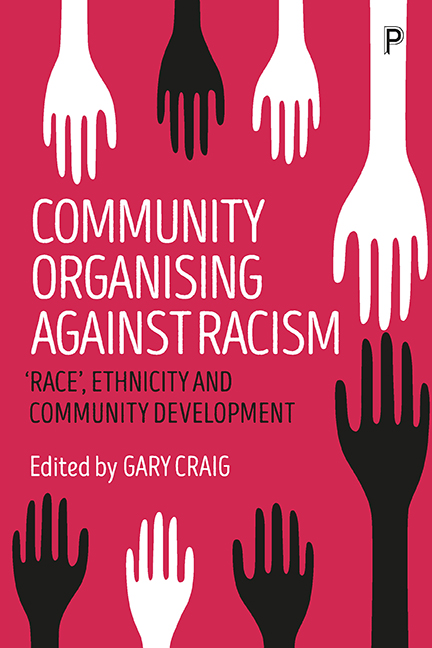Book contents
- Frontmatter
- Dedication
- Contents
- List of figures
- Author biographies
- List of abbreviations
- Introduction
- Section One Community development with ethnic minorities: history, theory, policy
- Section Two Building capacity with BME groups
- Section Three Working with Roma communities
- Section Four Global experience
- Section Five Working across cultural boundaries: ideological and personal reflections
- Afterword: Messages for community development in working with minority groups
- Index
Fourteen - Building strengths in asylum-seeker communities in Australia
Published online by Cambridge University Press: 12 April 2022
- Frontmatter
- Dedication
- Contents
- List of figures
- Author biographies
- List of abbreviations
- Introduction
- Section One Community development with ethnic minorities: history, theory, policy
- Section Two Building capacity with BME groups
- Section Three Working with Roma communities
- Section Four Global experience
- Section Five Working across cultural boundaries: ideological and personal reflections
- Afterword: Messages for community development in working with minority groups
- Index
Summary
Introduction
An asylum seeker receiving individual casework said of her experience:
“The only hope for people like me is Red Cross. I thank first to God. Second to the Australian Government because I feel safe. And third Red Cross.” (Briskman, 2014a, p 60)
Australian Red Cross (Red Cross) has for many years delivered highquality, strengths-based individualised casework services. In the last few years, our experience, on-going consultation with asylum seekers and a rapidly growing number of clients drove Red Cross to consider a broader, more adaptive and more inclusive community development model. Such a model would encourage resilience and self-reliance, would recognise the role of the community in supporting dignity, health, well-being and social inclusion and would bring clients in as their own experts. However, in determining this change, Red Cross was faced with the challenge of implementing a community development model in a large, formal organisation with a group often considered by the broader Australian community as ‘outsiders’, and without access to many mainstream services and opportunities.
This chapter discusses how Red Cross, through its vast experience of casework with people seeking asylum, adapted and changed the service delivery model from individual casework to a community development approach. This approach recognises the essential role of community in resilience and well-being, and holds much potential. However, implementation is also fraught with ethical and practical tensions, largely arising from the external policy environment. Red Cross, as an impartial, humanitarian organisation mandated to provide assistance based on need, has had to consider the implications and develop responses when working as a contractor to government, where the scope of the service-provider role is clearly defined within government policy.
We draw on insider and outsider expertise of Red Cross. Two of the authors have had many years of experience working in asylumseeker programmes within Red Cross. The third is an academic with research expertise in the area of asylum seeking, who conducted an evaluation of the Red Cross Casework Model at the time when the organisation was transitioning toward community development. In order to provide context for the chapter, we first provide an overview of asylum seeking in Australia, then describe Red Cross work in this domain. We then turn to the entry of Red Cross into the community development field, probing the benefits and limitations.
- Type
- Chapter
- Information
- Community Organising against Racism'Race', Ethnicity and Community Development, pp. 231 - 244Publisher: Bristol University PressPrint publication year: 2017



